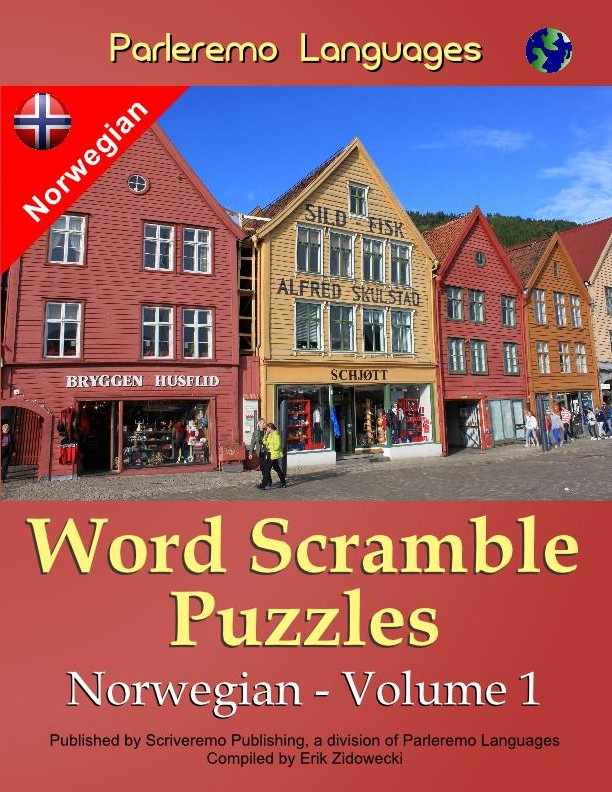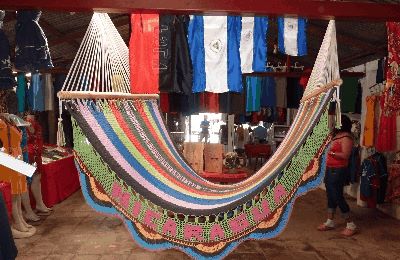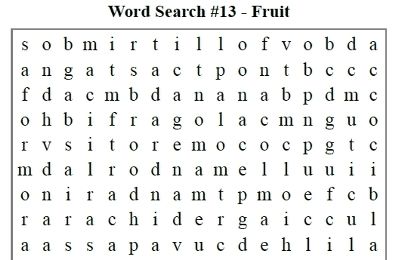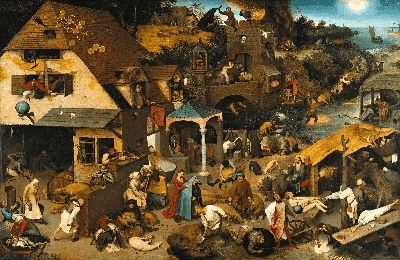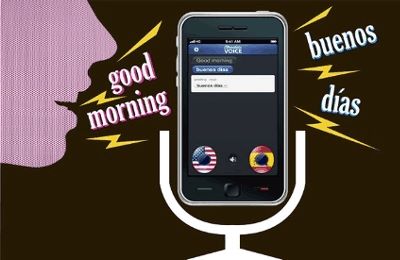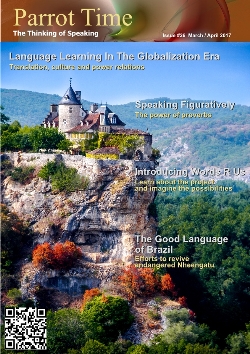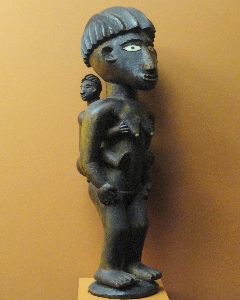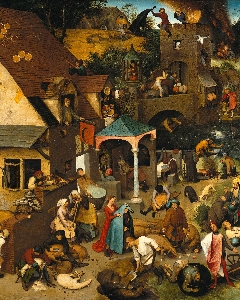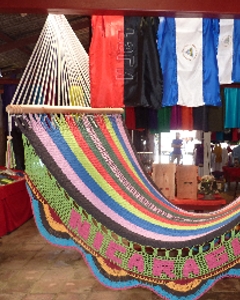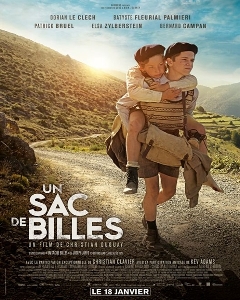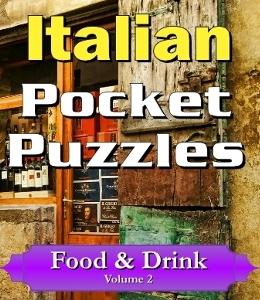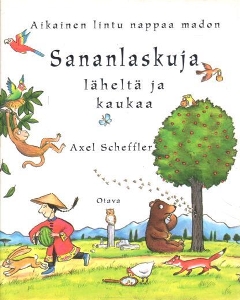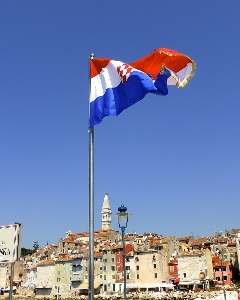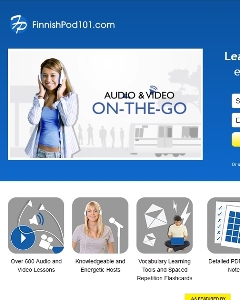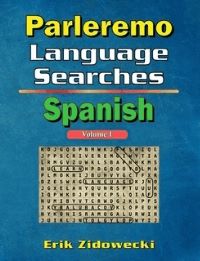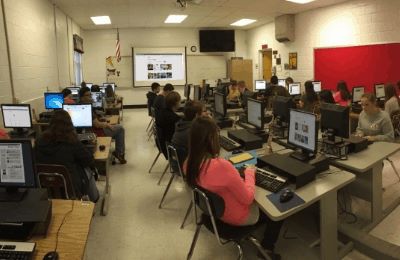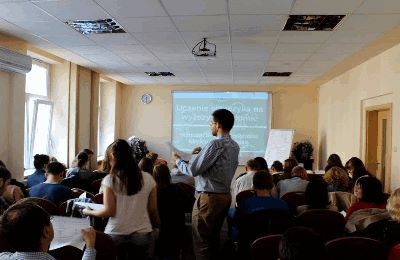
|
Words Mean Things and it is the study of those meanings and how they carry across languages that is the serendipity of the Words R Us system. Imagine the Possibilities! Words R Us is based on an idea developed in prototype at Princeton University. Their initial implementation was based on a study of the English language to explore not only how words fit together into sentences, but how they fit together in the way we think. For example, when you think of the word dog, what comes to mind? The first thoughts are the family pet, then maybe the word cat which really has nothing to do with the definition of dog, but they are both family pets. Cats elicit arrogance, fluffy, litter box, lion, fierce, jungle, Burkina Faso - well, you get the idea. All our minds think along different lines but we all relate words to ideas and concepts. 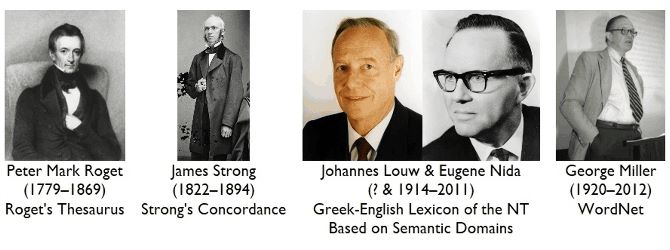 Milestones in Word Studies Peter Merk Roget was a British physician, natural theologian and lexicographer. He is best known for publishing, in 1852, the Thesaurus of English Words and Phrases (Roget's Thesaurus), a classified collection of related words. Roget began preparing for publication of his thesaurus about 1848, the one work that was to perpetuate his memory. This was the catalogue of words organized by their meanings, the compilation of which had been an avocation since 1805. Its first printed edition, in 1852, was called Thesaurus of English Words and Phrases Classified and Arranged so as to Facilitate the Expression of Ideas and Assist in Literary Composition. James Strong was born in the early 1800s and was a Methodist scholar. He distinguished himself at Wesleyan Seminary, Troy University and Drew Theological Seminary where he taught for many years. His best known work is Strong's Exhaustive Concordance of the Bible, first published in 1890. "Strong's numbering" of Greek and Hebrew words, has dominated the enumeration of such words in Bible study helps to the present day. For the concordance, Strong numbered every Hebrew or Greek root word which was found, for ease of reference. This numbering system (8674 Hebrew roots and 5523 Greek roots) is now widely used in the English speaking world. Beginning in the mid 1900's, James Louw and Eugune Nida, building on the concept developed by Roget and Strong, created a modern Greek lexicon using the concept of "semantic domains." This lexicon differs from other lexicons in that it does not arrange words alphabetically and it does not give one listing of a word with all of that word's meanings after it. Instead, it breaks words down by their various shades of meaning. It then groups all of those entries together and organizes them by topics and sub-topics. It shows the nuances in word meanings and explains difficult expressions and idiomatic usages of words, and even provides advice on how words might be translated under various conditions. Since it groups words by meanings, it shows distinctions in meaning between similar words, and also between differences in one word's meaning in different contexts, as well as showing the overlaps between word meanings. George Miller, working at Princeton University in the 1980's through early 2000 took the concept of semantic grouping of words and applied it to Wordnet, the predecessor of Words R Us. While the work on an English Wordnet continues, the concept of a Wordnet has proven effective in forming the basis of modern machine translation of languages. Today Wordnets are available or under development in many languages of the world. Words R Us brings together languages by word meanings in a way that transcends the traditional approach of language learning. This new paradigm is unique, as you will see as you explore its use. Logos for Us brings Strong's numbering system and Wordnet's numbering system together, opening up an amazing opportunity for both multi-lingual word studies and Bible study particularly in languages which have little available in the language other than the Bible. Since the majority of the world’s languages, numbering over 8,000 have some portion of the Bible available in their language, we are now able to present a content rich method of Bible study and language learning, not available previously. We invite you to explore Words R Us and Logos for Us. Imagine with us the possibilities! The Words R US system consists of word files, code to convert these files into a database, and search routines and interfaces that display information from the database. The files organize nouns, verbs, adjectives and adverbs into groups of synonyms, and describe relations between synonym groups. WordNet 1, a lexical database for English, can be thought of as a large electronic dictionary. It contains information about some 155,000 nouns, verbs, adjectives, and adverbs, including simplex words like put, phrasal verbs like put up, and idioms like put out the dog. Its digital format frees WordNet from the constraints of traditional paper dictionaries, whose entries have to be arranged according to their spelling (and thus, to some extent, their pronunciation). But since an important function of dictionaries is to inform users about word meanings, entries in WordNet are organized in terms of their semantics. Specifically, words in WordNet that are similar in meaning are interlinked by means of pointers that stand for a semantic relation. Formally, WordNet is a semantic network, an acyclic graph. Note that the original Wordnet did not include Proper Nouns, pronouns, prepositions, conjunctions and interjections. The most recent iteration of the database introduced a large body of Proper Nouns as well as many terms from the field of natural science. Our edition of Words R Us incorporates the missing pronouns, prepositions, conjunctions and interjections as well as a glossary of Acronyms and Abbreviations.
New Glossaries in Words R Us
How Words R Us Works All our minds think along different lines but we all relate words to ideas and concepts. Perhaps the best way to explain Words R Us is to explore it for yourself. Click on the Explore tab on the web site and explore this site. Then click on one of the featured languages and explore the dictionaries and visual implementations of Words R Us. Your Words R Us will support up to 5 language packs or specialty glossaries that fit your business focus or education specialty. You may choose from hundreds of available language packs or easily add your own words, concepts and sample sentences using our WIKI Editor's System. My Story I was first exposed to the need for language learning materials in Haiti in 2000. I had gone there with our church youth group as a chaperone and while there I enquired about libraries, school books, newspapers, etc. I found virtually nothing available in Kreyòl (Commonly called Creole.) When I returned I did a world-wide search for books in Creole and found at that time 34 books in the language. Most were “How to Speak Creole” books done by various organizations, a few simple poetry books, and children’s books. The Bible had been translated in the 1940’s, but virtually nothing had been done since then. I decided to focus on producing material in Kreyòl in 3 areas; health care, Bible Study, and education. By 2010 I had published, or been involved in publishing about 30 titles.  Poverty stricken Haiti getting some relief from volunteer workers In 2010 I was in Haiti when the earthquake struck and experienced first-hand the difficulty that the aid workers were having communicating. I was able to return from Haiti a week after the quake and immediately contacted Google and Microsoft about the need to have a machine language translation tool. Both companies brought amazing resources to bear, using my dictionary with had about 17,000 words along with some other word lists and we had a working machine translator available within two weeks. Both have come a long way in the past 7 years – especially Bing by Microsoft and the Kreyòl translator now is better than the French translator. In this process I learned of the inner workings of machine translation systems and the requirement that we need 50,000 words and 200,000 paired sentences to create an effective beginning translator. It wasn’t until 3 years later when we moved to a new home that I was introduced to Burkina Faso, a country in west Africa. These people have not just French, Kreyòl, and English to contend with, but 77 languages spoken in a country about the size of Colorado. Of these 77 languages, only about a dozen have the Bible translation finished, so literacy in their native language is virtually non-existent. It was about this time that I discovered Wordnet and after almost a year of studying the structure, I began serious work on Words R Us. My particular focus is on providing literacy materials for “those other 7,900 languages” not available on the Google and Bing translation systems. The mechanisms of how this all comes together are the basis for another article. I invite you to join me in working on this system. All of the dictionaries and databases are available under a General Public License. I only ask that you credit WordsRUs for our contribution. Imagine the Possibilities! John C. Rigdon has authored a number of books on the American Civil War and is the manager of the web site, Research OnLine, (www.researchonline.net) the premier site for researching Civil War ancestors in the Civil War. His titles include the Historical Sketch and Roster Volumes (1100 plus titles) and a dozen volumes in the "We Fought" series focusing on particular battles and commanders. Additionally, John works in translation of materials in several languages and maintains the website, www.wordsrus.info. John resides in the foothills of the Appalachians outside Cartersville, GA. where he enjoys gardening and aquaponics. You may reach him at jrigdon@researchonline.net. |
| Introducing Words R Us | |||
| Writer: | John C. Rigdon | ||
| Images: | |||
| |||
All images are Copyright - CC BY-SA (Creative Commons Share Alike) by their respective owners, except for Petey, which is Public Domain (PD) or unless otherwise noted.
|
Searching for language resources? Scriveremo Publishing, has lots of fun books and resource to help you learn a language. Click the link below to see our selection of books, availlable for over 30 langauges!
| |
comments powered by Disqus
